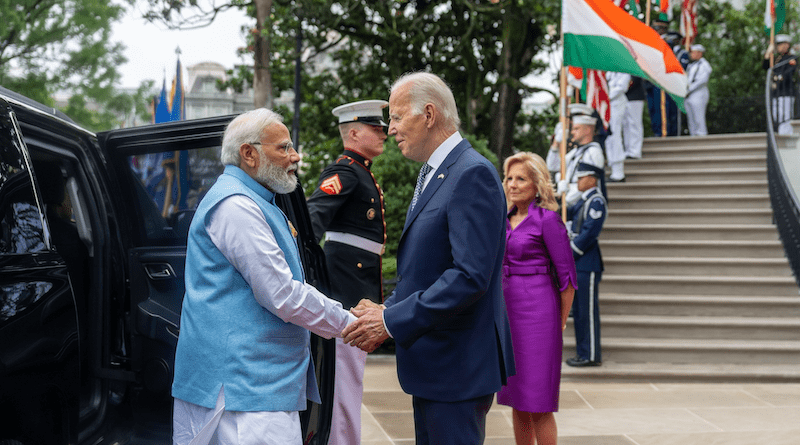Striking A Balance: Navigating US Strategic Interests And India’s Human Rights Situation – OpEd
Discussions surrounding India’s human rights situation were a recurring topic during Prime Minister Narendra Modi’s visit to the United States. Despite being suggested by the U.S. Commission on International Religious Freedom (USCIRF) to be listed as a nation of particular concern due to human rights abuses, the U.S. government has refrained from taking this action, citing strategic reasons as the main justification. However, an increasing number of voices argue that addressing human rights issues is crucial, even amidst conflicting geopolitical interests.
During the recent meeting between President Joe Biden and Prime Minister Modi at the White House, the U.S. emphasized religious pluralism as a core principle for both countries, while acknowledging that democratic values face challenges worldwide. While President Biden made a faint reference to India’s human rights situation, the press conference primarily focused on strengthening India-U.S. ties and facing global challenges together.
However, several U.S. politicians, including those who welcomed Modi, expressed concerns about alarming trends in India, such as a constricting political landscape, rising religious intolerance, and restrictions on media and civil society groups. The lawmakers stressed the need for a “close and warm relationship” between India and the U.S., founded on common principles, and urged candid discussions about their disagreements, including issues concerning human rights.
The world community closely monitored Prime Minister Modi’s remarks to the joint session of the House and Senate to observe how both nations handled the delicate balance between strategic objectives and human rights considerations.
Despite consistent concerns raised by the USCIRF about India’s human rights and religious freedom, the U.S. seemed hesitant to designate India as a country of particular concern, prioritizing strategic interests over human rights during the visit.
India, as a prominent democracy with a rapidly growing economy, held significant sway in the international arena. Strengthening ties with India was deemed essential by the U.S. to address regional issues, counter the influence of other major countries, and promote economic cooperation. However, in the pursuit of these interests, the U.S. appeared willing to overlook pressing human rights concerns in India.
While the U.S. publicly champions democracy and human rights, it seemed willing to turn a blind eye to India’s human rights violations in the name of preserving strategic alliances during the visit. This willingness to sacrifice principles for convenience was a testament to the pragmatic approach of the U.S. government.
With the rise of social media and instantaneous communication, global perspectives on human rights have undergone significant changes, leading to heightened public awareness and demands for assertive actions in support of human rights. However, during the visit, the U.S. seemed hesitant to take a firm stance on India’s human rights record, perhaps due to the fear of jeopardizing economic ties and regional stability.
As India’s influence continues to grow on the international stage, it becomes all the more critical for the world community to scrutinize its human rights record. While every country is expected to uphold core human rights principles, the U.S. appeared reluctant to hold India accountable for its violations, raising questions about its commitment to human rights promotion during the visit.
Despite having an opportunity to contribute to resolving India’s human rights issues during the visit, the U.S. appeared more inclined towards maintaining diplomatic relations than pursuing meaningful change. This reluctance to exert significant pressure on India to uphold human rights standards demonstrated a lack of genuine commitment to the cause.
During the visit, rather than engaging in assertive diplomacy, the U.S. seemed content with mere lip service when it came to human rights concerns in India. The lack of robust action undermined the credibility of the U.S. as a global advocate for human rights, exposing the hypocrisy in its approach.
In striking the elusive balance between protecting strategic interests and addressing human rights issues during the visit, the U.S. needed to confront its double standards and show unwavering support for human rights. While it was challenging, the U.S. could not overlook the importance of upholding democratic values and principles, even in the face of complex geopolitical dynamics.
The U.S. had a responsibility to be more critical and proactive in contributing to the resolution of human rights issues in India during the visit. Diplomatic pressure should have been applied assertively to ensure that India strengthened its human rights laws and treated all citizens equally, regardless of religion or race. Mere verbal emphasis on international human rights standards would not suffice; tangible advancements were required to bring about meaningful change.
It was high time for the U.S. to put human rights at the forefront of its relations with India. The pursuit of a just and equitable world required a commitment to uphold the values of democracy and human rights consistently, without exceptions. The U.S. needed to seize the opportunity to be a genuine advocate for change, rather than a passive bystander to India’s human rights predicament during the visit.
Collecting the facts by the end and addressing the issue, it is imperative for the United States to prioritize human rights in its relations with India. Meaningful action, not just rhetoric, is required to address India’s human rights issues. Upholding democratic values and principles is essential in fostering a just and equitable partnership between the two nations and steps must be taken for a brighter future for the world at large.


what are you views on interests of the US which they need to prioritize?